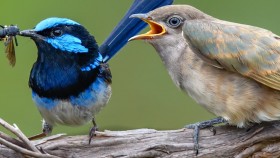David Duchêne
Research background
My career began at James Cook University in 2008, where I studied marine biology and was exposed to the wonderful Coral Sea. As an honours student, I explored the history of the association between gobioid fishes and their host corals. I then embarked in a PhD at ANU, aiming to examine a range of topics in the field of molecular evolution and macroevolution. This was followed by a postdoc position that started in 2016 at the University of Sydney, where I studied methods that test the reliability of our inferences about the tree of life. I did this in part with a focus on the evolution of Australasian marsupials. This led me to my current DECRA project, on the genomic evolutionary signals of marsupials, starting this year at the Moritz lab.
Current research interests
My current research focuses on the genomic signals of the radiation of Australasian marsupials using the statistical tools in the field of phylogenomics. This will involve analysis of genome-scale data generated as a part of the Oz Mammals Genomics initiative consortium. Marsupials provide an exciting system with a diversity of historical processes, including widespread hybridization events, fast radiations, and several intriguing and ancient species-poor taxa (e.g., numbats, koalas, and moles). I hope to gain an in-depth understanding of marsupial diversification. This will also require studies on the power of our methods to reliably retrieve the tree of life and the genomic processes behind it.
What do you enjoy most about your research?
The field of phylogenetics is a rich community with an increasing number of sub-fields. While inferring the relationships among taxa is one core question, phylogenetic models are routinely applied for inferring a great number of parameters, including the timing of evolutionary events, biogeographic history, rates of pathogenic infectious spread, patterns of molecular evolution, ancestral states, among many others. There is also a wealth of views regarding the study of the tree of life, so the field brings together evolutionary biologists, biochemists, mathematicians, and statisticians to name a few. The richness of questions and scientists involved is definitely a reason to show up every day.








